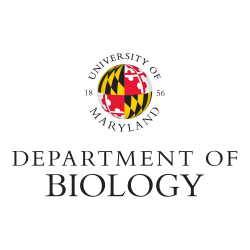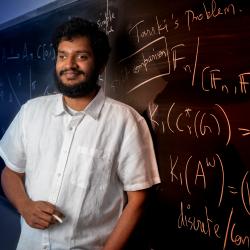Sixteen CMNS Projects Receive Inaugural UMD Grand Challenges Grants
The University of Maryland today awarded $30 million to 50 projects through its Grand Challenges Grants Program, an institution-wide initiative to tackle major societal issues.
The College of Computer, Mathematical, and Natural Sciences (CMNS) received 16 Grand Challenges grants—and CMNS faculty members lead 11 of them. Representing nine departments and five research institutes and centers in the college, these projects aim to address climate change, human health and disease, artificial intelligence and inclusion in STEM.
Institutional Grants
New institutional structures that catalyze cross-disciplinary collaborations around a grand challenge focus or theme
Addressing Climate Challenges for a Sustainable Earth – This initiative will provide monitoring and prediction to help protect Maryland communities from climate impacts and extreme weather, help policymakers and farmers optimize agriculture productivity and sustainability in the face of climate change and reimagine experiential education for students.
CMNS Team Members: Ellen Williams (principal investigator), Timothy Canty, James Farquhar, Sumant Nigam
Global FEWture Alliance – The Global FEWture Alliance will collaborate with international partners to scale technology-based solutions, community building and experiential education focused at the food-energy-water-climate-health nexus to alleviate food and water insecurity, protect environmental and global public health, and bolster community resilience in a changing climate.
CMNS Team Members: Gili Marbach-Ad, Xin-Zhong Liang plus CMNS alum Amy Sapkota (B.S. ’97, biological sciences; principal investigator)
Impact Awards
Cross-disciplinary collaborations that address a grand challenge focus or theme
Maryland Institute for Digital Accessibility – These projects will make more digital technologies and content accessible for people with disabilities and create technologies that may alleviate inaccessibility in the physical world, leading to fewer structural barriers, more inclusion in society, better educational outcomes and employment success for people with disabilities.
CMNS Team Members: Huaishu Peng, Abhinav Shrivastava
Microbiome Sciences – This initiative will conduct transformative research to advance microbiome science and support the development of a regional innovation ecosystem that contributes to economic growth in microbiome-related industries in Maryland.
CMNS Team Members: Mihai Pop (principal investigator), Brantley Hall, Elizabeth Quinlan
Values-Centered Artificial Intelligence – This center aims to have local, national and international impact to move artificial intelligence from a technology-centered approach to a values-centered approach. By combining top-down ethical considerations and bottom-up community insights, this approach has the potential to transform the practice of artificial intelligence globally.
CMNS Team Members: Hal Daumé III (principal investigator), Jordan Boyd-Graber, Marine Carpuat, John Dickerson, Furong Huang, Huaishu Peng, Pratap Tokekar
Team Project Grants
Projects advanced by research teams that are targeted toward a specific component of a grand challenge topic or theme
Remediation of Methane, Water, and Heat Waste – This team will use geophysical instruments to identify, map, and measure air and water contaminant sources on campus. They will also conduct methane emission mapping excursions in Maryland using aircraft outfitted with UMD methane sensors. In coordination with campus and state authorities, they will analyze the results to produce recommendations for the joint remediation of environmental quality challenges and develop the basis for a national strategy.
CMNS Team Members: Daniel Lathrop (principal investigator), Russell Dickerson, James Farquhar, Sujay Kaushal
Effective and Equitable Weather Forecasting in a Changing Climate with Machine Learning – This project aims to characterize and improve machine learning weather forecasting, with an emphasis on designing systems that are both accurate and equitable. The project aims to significantly and meaningfully advance the science of weather forecasting by expanding beyond the traditional focus on physical processes to include uncertainty and societal considerations in the forecasting workflow.
CMNS Team Members: Maria Molina (principal investigator), Christopher Metzler
Modeling the Evolution of Avian Influenza Viruses – Understanding how avian influenza viruses evolve in their avian hosts is important to model the emergence of novel influenza strains. The long-term goal of this project is to generate intestinal and epithelial culture models and use them as tractable systems to mimic the interaction of avian influenza viruses with the avian respiratory and intestinal tracts and answer key questions about pandemic preparedness.
CMNS Team Member: Margaret Scull
Helping Our Bodies Clear Respiratory Infections – Mucus buildup is seen in numerous diseases (e.g., cystic fibrosis, COPD, COVID-19) and can lead to chronic infections. This team plans to engineer a protease specific to the mucin proteins that are produced in excess in these diseases while leaving other protective mucin proteins untouched. Because this novel therapeutic targets overexpressed mucins, it can be effectively used against various microbes that cause disease due to their persistence in the respiratory tract.
CMNS Team Member: Louisa Wu (principal investigator)
Music Education for All Through Personalized AI and Digital Humanities – Building on existing research and data collection that started in March 2020, this team plans to develop an artificial intelligence platform, VAIolin, that will democratize music education. This innovative platform will integrate technology into the mechanism of learning an instrument and use artificial intelligence to assist in the process of mastering principles and skills, facilitating self-analysis and enhancing independent learning.
CMNS Team Member: Cornelia Fermüller
Fostering Inclusivity through Technology (FIT) – This research will bring together autistic people, social scientists, technologists and other stakeholders to describe communication needs in workplaces, understand real-time communication dynamics in single- and mixed-neurotype interactions, and develop efficacy and ethical criteria for technology to support autistic-neurotypical communication. FIT is a video-calling platform that promotes mutual understanding by highlighting team sentiment, building rapport with strangers, connecting past and current topics in conversations, and unobtrusively identifying and resolving misunderstandings.
CMNS Team Member: Ira Kraemer (M.S. ’21, neuroscience and cognitive science)
Individual Grants
Projects by individual investigators that are targeted toward a specific component of a grand challenge
Bridging the Gaps in Satellite Observations of Earth Systems to Support Climate and Environmental Products – Veljko Petkovic will develop a satellite-based product to combat climate change. The product will offer an inexpensive solution for transforming existing geostationary satellite data into an information-rich product, helping bridge the current spatiotemporal gap in low-Earth-orbiting satellite observations and allowing advancements in monitoring and prediction of climate and weather systems.
Toward an Early Warning System for Increased Probability of Community Infection by SARS-Cov-2 Variants – Augustin Vintzileos will develop an early-warning (weeks to months) and long-term planning (climate change projections) system for the probability of infection by SARS-CoV-2. This project is led by the first interdisciplinary team of virologists and climatologists to show an association between climate conditions and mortality displacement. The team will produce maps of future COVID-19 sensitivity connected with long-term climate projections over Maryland and continue monitoring and modeling the relationship between COVID-19 mortality and climate change.
Advancing Environmental Justice By Evaluating Climate-Ready Urban Street Trees In Historically Redlined Neighborhoods – Karin Burghardt will create more climate change-resilient cities by enabling targeted, effective tree species choices through an approach that directly acknowledges the environmental injustice built into U.S. cities. By measuring five-year growth, survival, condition and insect populations of trees in Baltimore neighborhoods, this team will generate data and products identifying trees that are climate and urban-ready and likely to perform best in previously redlined neighborhoods.
Increasing Participation of Minorities and Women In STEM Through Sports Performance Analytics Research – Yanir Rubinstein will create a mobile version of his existing mathematical sports performance research laboratory for students that can be transported to schools in the D.C. metro area. Through a series of bimonthly experiential learning activities, students will learn hands-on about sports performance analytics and use state-of-the-art software and equipment. The project will focus on reaching students in secondary schools in the D.C. metro area who are traditionally underrepresented in science, technology, engineering and mathematics.
Accurate, Equitable, and Transparent Genetic Ancestry Inference – Michael Cummings seeks to develop improved computational methods to more accurately infer genetic ancestry at the sub-chromosome level (i.e., segments of chromosomes). These improvements will advance health care justice and contribute to the general understanding of the principles of population genetics, evolution and the genetic basis of human biology.






